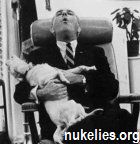Surrealism was invented by a group of Spanish and French artists and writers and film-makers; or at least given that name by them. The general approach was a sort fairly systematic irrationality, with shocks. This was at the time of the 'Spanish Civil War'. That war was very brutal and cruel, but the point here is that it was also impossible to get reliable information about it - for one thing, there was a Jewish element which naturally was censored completely at the time. Other aspects included secret funding, secret backing by the British, and so on. Just as with wars now - Iraq, Libya etc etc - lies dominate. The natural artistic reaction during the Spanish Civil War was (maybe) surrealism - for one thing, it avoided all consideration of the actualities of their present-day conflicts. In the same sort of way, during the First World War there were a few movements - vorticism, the 'Dadaists', which turned away from what was happening. BBC radio after WW2 had the 'Goon Show'. Bob Dylan (at the time of the Vietnam War), and, later, Monty Python of the BBC's state propaganda illustrate the same sort of thing.
And there's something analogous in science: in the late 19th century physics and mathematics seemed pretty much sewn up, so that the only progress seemed to be through frankly weird speculations. After 1945, there's been almost no space in science journals to wars - where are the accounts of birth defects in Vietnam caused by American chemical warfare, for example? They're even censored out of medical reference books. I think this sort of psychology helps explain attitudes to science fiction, the uncritical promotion of completely impractical ideas, the failures of 'intellectuals' generally to address important issues.
[Added March 2015: A related issue is evasion by intellectual timewasting. For example, the Times crossword, noted as a benchmark for complication, and including quotations from English literature (and Latin, Greek) and puns, anagrams, and general wordplay involving ambiguities and wordplay, was introduced in he 1920s. (An Aldous Huxley story has an anti-hero who liked simpler crosswords). During the Second World War, British scientists are reported to have wasted, or enjoyed, enormous numbers of man-hours on problems of coin weighing. This is obvious enough, of course. My reason for commenting was a look back at detective stories, and other books, by Michael Innes (Professor J I M Stewart) who was in his 30s during WW2. His stories have fantastical plots, though mostly based discreetly on money shortages, but always avoided forbidden thoughts.
Projecting back in time, and outwards geographically, we might expect similar movements, assuming some degree of freedom - RW]
Surrealism as a device of psychological evasion
6 posts
• Page 1 of 1
-

rerevisionist - Site Admin
- Posts: 1056
- Joined: 18 Mar 2011 11:40
Re: Surrealism as a device of psychological evasion
Here's a definition I found which corroborates your hypothesis:
And further:
People are naturally idolatrous, and this is because they want someone else to do their work for them. They volunteer to be enslaved. They demand lies. They willfully entrap themselves in the psychological evasion you cite. It is cult consciousness. India is perfect evidence of this setup. Gurus have what disciples need. All lies and all truth are needed by the voluntary victim.
surrealism |s?'re??liz?m|
noun
a 20th-century avant-garde movement in art and literature that sought to release the creative potential of the unconscious mind, for example by the irrational juxtaposition of images.
And further:
Launched in 1924 by a manifesto of André Breton and having a strong political content, the movement grew out of symbolism and Dada and was strongly influenced by Sigmund Freud.
People are naturally idolatrous, and this is because they want someone else to do their work for them. They volunteer to be enslaved. They demand lies. They willfully entrap themselves in the psychological evasion you cite. It is cult consciousness. India is perfect evidence of this setup. Gurus have what disciples need. All lies and all truth are needed by the voluntary victim.
-

NUKELIES - Site Admin
- Posts: 302
- Joined: 17 Mar 2011 15:53
- Location: UK/USA
Re: Surrealism as a device of psychological evasion
There was a small book I read a few years back titled, "Waiting for an Army to Die". It was about the US soldiers who had been poisoned in Vietnam. The author attributed the poisoning to dioxin in the Agent Orange herbicide.
The active ingredient in Agent Orange is called 2-4-D, and this is a very commonly used herbicide. It's used by utilities to clear power line right of ways, and by people who want to kill dandelions in their yard.
But the Agent Orange used by the military in Vietnam had high levels of dioxin that the commercial/civilian product didn't have. The author never approaches the question of Why? there was a higher lever of dioxin in the military version of the herbicide.
I would say it was done deliberately to poison the young soldiers. That must be something too horrible for most people to contemplate. The author does discuss that there was a high level of birth defects among babies conceived by these soldiers upon their return to the States.
There may be some limit to how much the mind can accept of seeing evil. Perhaps surrealism is a way to portray evil that can't be understood, or to lighten the thought of evil. Perhaps it's a 'mind control' or mind altering technique used to get people to accept evil by a little shock at a time, until their minds become used to it.
The active ingredient in Agent Orange is called 2-4-D, and this is a very commonly used herbicide. It's used by utilities to clear power line right of ways, and by people who want to kill dandelions in their yard.
But the Agent Orange used by the military in Vietnam had high levels of dioxin that the commercial/civilian product didn't have. The author never approaches the question of Why? there was a higher lever of dioxin in the military version of the herbicide.
I would say it was done deliberately to poison the young soldiers. That must be something too horrible for most people to contemplate. The author does discuss that there was a high level of birth defects among babies conceived by these soldiers upon their return to the States.
There may be some limit to how much the mind can accept of seeing evil. Perhaps surrealism is a way to portray evil that can't be understood, or to lighten the thought of evil. Perhaps it's a 'mind control' or mind altering technique used to get people to accept evil by a little shock at a time, until their minds become used to it.
-

FirstClassSkeptic - Posts: 671
- Joined: 20 Mar 2011 21:19
Re: Surrealism as a device of psychological evasion
Yes. Don't get me wrong; I can't blame people (much) for evading horrific truths. I quite liked the older Bob Dylan, and Monty Python ... but I always had the feeling they were missing things out.
-

rerevisionist - Site Admin
- Posts: 1056
- Joined: 18 Mar 2011 11:40
Re: Surrealism as a device of psychological evasion
Bob Dylan and Irving Berlin were both jewish, and neither one of them wrote anything original. Both of them stole everything they used, with a little modification.
Well, some might disagree with me on that.
There was that movie, The Manchurian Candidate where the subjects were shown brutal murders while at a garden party. These scenes came back to them in that way. Was that surrealism?
https://www.filmsite.org/manc.html
Well, some might disagree with me on that.
There was that movie, The Manchurian Candidate where the subjects were shown brutal murders while at a garden party. These scenes came back to them in that way. Was that surrealism?
Its two best scenes are the opening brainwashing sequence staged for POWs as a garden club party, and the climactic finale during a political convention in Madison Square Garden (at its original location - 8th Ave. at 49th St.).
. [Patriotic symbols and images abound throughout the film, often juxtaposed with contradictory, ironic meanings.]
To surrealistically convey this depth of meaning, the camera begins a slow, 360 degree, all-encompassing tracking shot around the meeting in the lecture hall - exhibiting a ladies' garden club party in the Spring Lake Hotel in New Jersey where an elderly white woman, Mrs. Henry Whittaker speaks tediously on the topic of "Fun With Hydrangeas." The laconic platoon is seated on stage with her - in the audience are about two dozen elderly ladies taking in the lecture on horticulture.
When the camera returns to the stage, 360 degrees later after the cyclical camera movement, a tall, bald Communist Chinese/Korean doctor-spylord Yen Lo (Khigh Dhiegh) is actually in charge and has taken the woman's place and voice. He introduces the captured, passive and impotent men, all drugged and hypnotized, who are seated in front of giant poster/photographs of Joseph Stalin and Mao Tse Tung. The doctor addresses an interested, assembled coalition of uniformed Koreans, Chinese, Soviets and civilians in a public demonstration of the powers of hypnotism:
https://www.filmsite.org/manc.html
-

FirstClassSkeptic - Posts: 671
- Joined: 20 Mar 2011 21:19
Re: Surrealism as a device of psychological evasion
Surrealism was more about irrationalism - odd irrelevant imagery. And words - 'conjugal diamonds ... vaccination of bread..' - and e.g. the game 'The exquisite corpse will drink new wine' where several people supply adjectives, nouns, and verbs. There was also Dali's rather manufactured surrealism, based on Freudian stuff, e.g. baguette sodomising a grand piano, though I think his visual puns such as nuns resembling Voltaire were a product of artistic skill. Max Ernst's paintings were a bit like science fiction - often with just a large sun to look strange. There's a famous film Le Chien d'Andalou I think from memory (The Andalusian Dog) - black and white, including scenes of an eyeball being cut, a woman defecating, and I think a comic funeral though this is in another film (too?).
For my taste the Manchurian Candidate had a concealed message, so the surreal stuff in the film has a purpose, not quite the same as the evasive or shocking oddities of surrealism.
On 'brainwashing' brainwashing-korea-hide-US-war-crimes.html
For my taste the Manchurian Candidate had a concealed message, so the surreal stuff in the film has a purpose, not quite the same as the evasive or shocking oddities of surrealism.
On 'brainwashing' brainwashing-korea-hide-US-war-crimes.html
-

rerevisionist - Site Admin
- Posts: 1056
- Joined: 18 Mar 2011 11:40
6 posts
• Page 1 of 1
Return to Other Revisionisms, Hyper-Revisionisms & Off-Topic Debates
Who is online
Users browsing this forum: No registered users and 1 guest